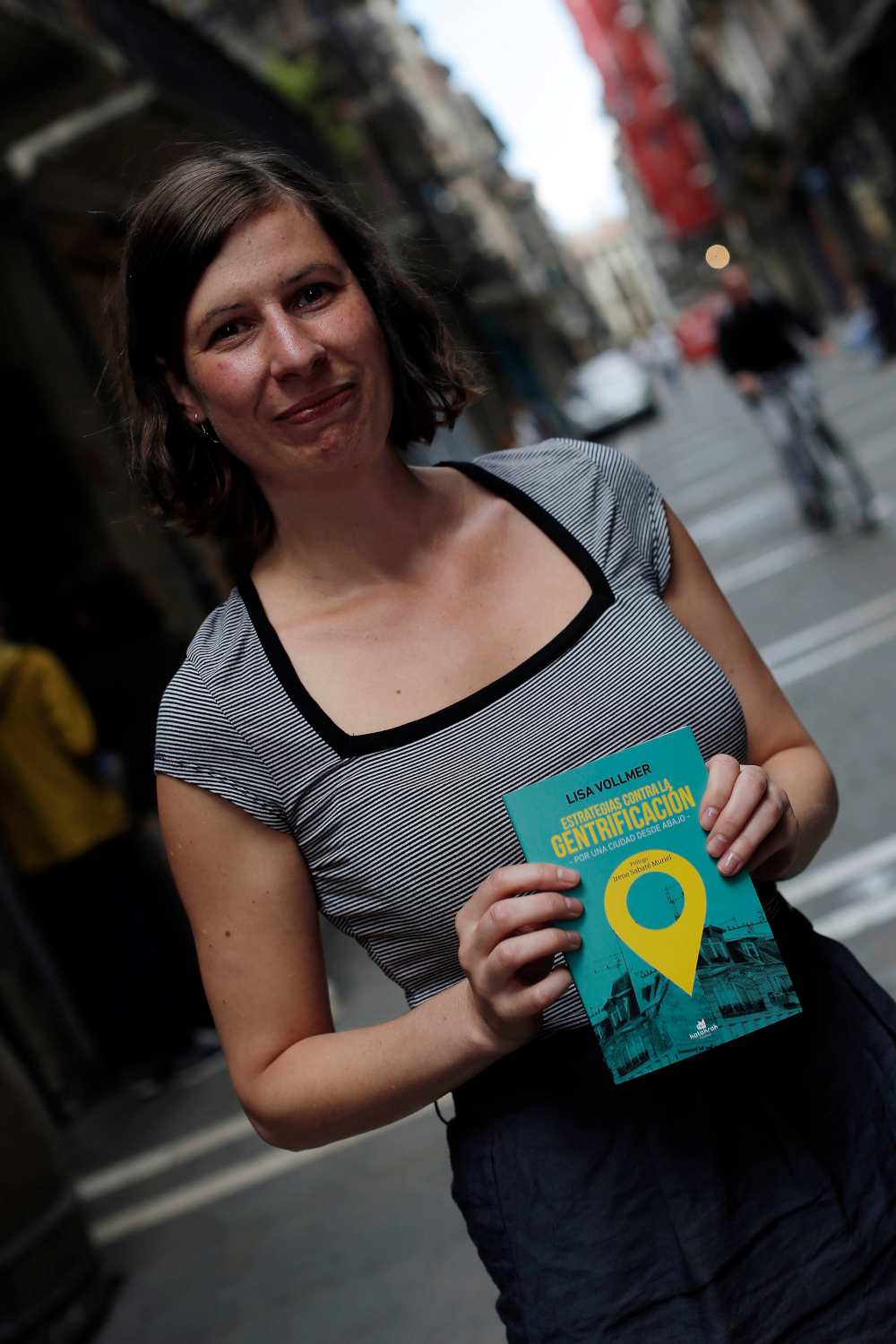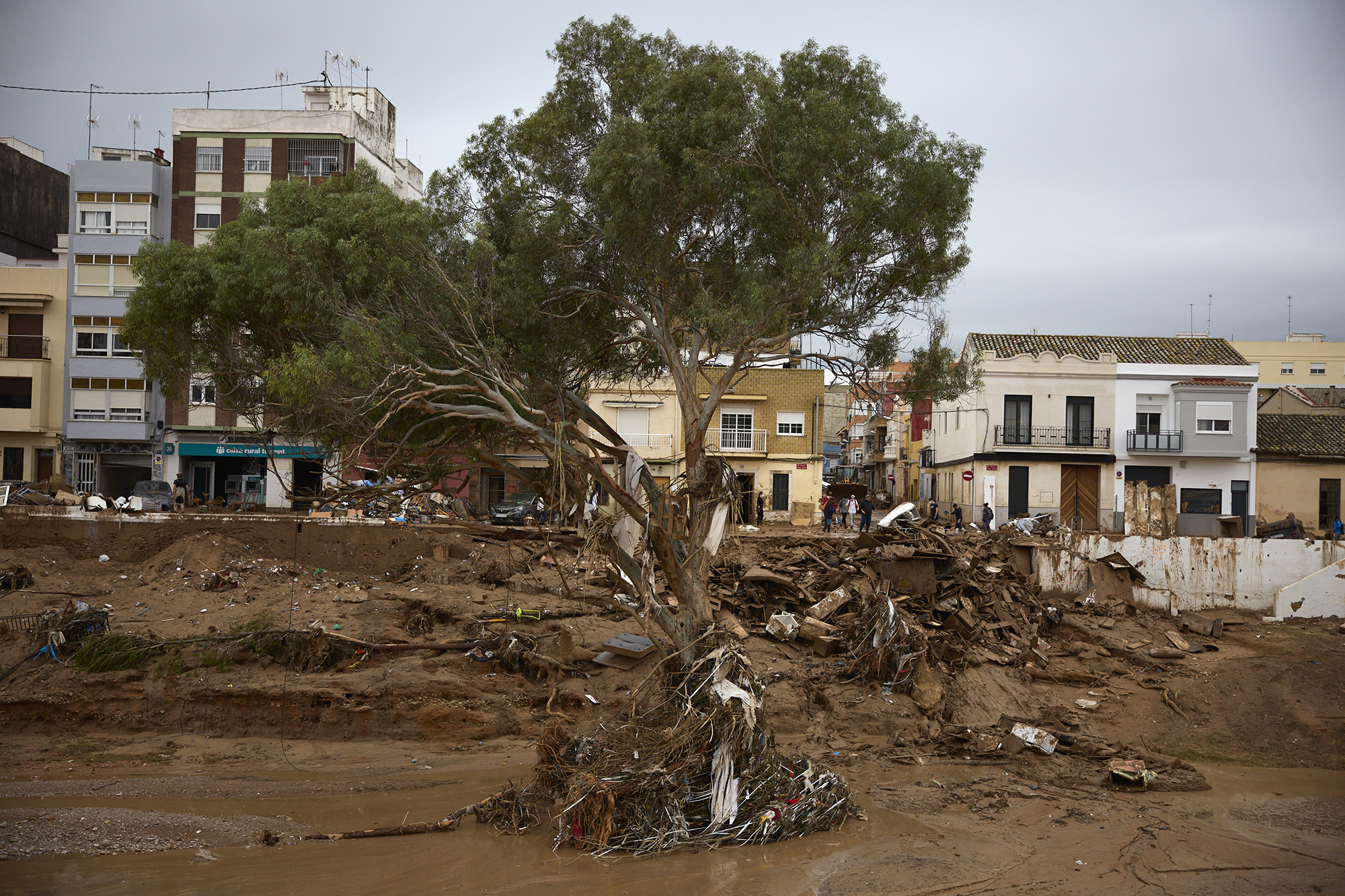"A new political subject is being built around housing issues"
- Besides working at the Institute of European Urban Studies of the Bauhaus University of Weimar, sub\urban. zeitschrift für critische stadtforschung (sub-urban) Lisa Vollmer (Radolfzell, Germany, 1987) is also a member of the journal's editorial team. As a member of the Berlin tenants’ movement, he has been in operation for years and is familiar with the movements and protests surrounding rental throughout Germany. This known reality has moved it to the field of research and analyzed the movements of the tenants of Berlin and New York in their doctoral dissertation. The editorial Katakrak has published in the book Strategien gegen gentrifizierung (Strategies against gentrification) some of the findings he has made through this research.

It's been analyzing gentrification processes. He says that in order to promote these processes, the middle class is promoted.
Gentrification must be understood within the context of the capitalist city and within the logic of the capitalist production of the city. For their study, real estate companies must be observed, who obtain benefits through gentrification processes. On the other hand, municipalities are also closely related to the lobbys of the real estate industry, whose interests respond through corrupt practices. The interests of municipalities are focused on attracting rich people and displacing the poor, as gentrification falls on the richest people who pay more taxes and get tax benefits. That's gentrification: the displacement of poor people through the richest people.
This promotion of the middle class generates certain lifestyles, which are often considered to be the culprits of gentrification: artists, hipsters, etc. However, you argue that they are merely the expression of gentrification.
Blaming the groups or subjects mentioned presupposes diverting attention from what is really important. Behind this dynamic is a strategy that blames various social groups and limits tension to a moral debate. This debate, instead of focusing on the interests and structures behind gentrification, points to people’s practices, and on that basis seeks the guilty.
We should be clear that collectives are not the main problem, but the victim of gentrification processes. For example, artists who feel guilty are cheap places that allow them to do their jobs, and in some places they engage in movements against gentrification. What's more, they're a valuable asset because mobilizations make them more fun and colorful, and they have tools to create narratives that can be useful for movement.
"The gentrification process has several stages, with many displacement waves"
The expulsion of the inhabitants of a neighborhood is the basis of gentrification, as the middle class that has initiated a gentrification process can be expelled throughout the same process. You call this phenomenon “supergentrification”.
The gentrification process has several stages, with numerous displacement waves. You can start with the artists listed or the students, but they can also be kicked out. The first link of the displacement process can be displaced through a richer middle class, while the secondary sector can be eliminated by the upper class. In Germany, for example, the reality is very different from here, it's a lot of people living on rent, even in the middle class. It therefore affects these processes.
How does this all relate to tourism?
The effects of turistification and gentrification are inseparable and their relationship can be seen in three areas. On the one hand, it helps residents to become tourist dwellings, as can be clearly seen from the activity of companies such as Airbnb. Secondly, economic gentrification is given way: tourists and the richest class that has just arrived in the neighborhood drive other types of shops, displacing those that had been their shops until then. On the other hand, the different uses of public space made by tourists and their inhabitants also generate conflicts.

He also talks about day-to-day travel: increasingly, he states that individuals act as tourists in their own city. Who is the tourist subject?
The question is difficult to answer. In the Academy, a term has been extended: neotourism. In fact, today tourists not only look for signs of a place, but also want to visit authentic, local or touristic places. Likewise, the inhabitants of the cities that are the starting point of tourism are the individuals who travel with the same dynamics to other tourist destinations. And that makes the distinction between who he is and who he is not difficult.
On the other hand, it is often difficult to determine who the tourist is. For example, with the economic crisis, many Italians and Spaniards moved to Berlin, and in such cases it is difficult to determine what the tourist is and what the native is. The distinction between tourists and locals should not be based on individual differences, but on the different practices of use and consumption of the space they make.
Airbnb non, turistification in situ.
There is a great deal of debate in Germany on the issue of tourist apartments, and in the face of this trend, public administrations are also pushing for a number of policies. The City of Berlin, for example, has banned apartments from becoming a tourist home. The problem is that they have not hired anyone to monitor the measure, so there is no inspection of the measure put in place.
With the entry into force of this law, the Airbnb company put up posters all over the city. In them several people were seen, along with the following citations: “My neighborhood is very plural, but now they don’t let me rent my room.” Most of the people on the posters were people of different colors and ethnicities, with surnames that were not German. Thus, the company diverted the ban on turning housing into tourist grounds and described them as racism.
"There are three pillars to eradicate the neoliberal housing policy paradigm: accessibility, democratization and de-commodification"
Given the housing problem, the need to build the city from below has been evidenced. Would you say that the political subject of the tenant is being created, which politicizes the issue of housing and puts it collectively?
The housing issue echoed a lot in Berlin in the mid-2000s, and tenants created partnerships. Many of the initiatives promoted by them resisted increases in rent prices and were organized by politicizing the housing issue. Until then, for some 20 years, there had been hardly any political debate on the right to housing.
The initiatives of renters are very varied and include very diverse groups: people of different origins and ages, migrants and not, with or without political experience… in practice a new political subject is being built, crossed by different borders and problems.
According to you, there are three pillars to eradicate the paradigm of neoliberal housing policy.
Yes, accessibility, democratisation and de-commodification. Since gentrification is a housing policy, accessibility is very important for housing to be accessible to low-income people. In order to do this, we need resolute regulation of the rental pricing system, so that prices are not very high. But since the essence of the housing market is the benefits, housing has to be de-commercialized. We have to build public buildings; or to make private housing a public purchase, and expand the collective housing sector, such as collective housing projects or cooperatives.
In order for the individuals to be part of the construction processes of the new neighborhood nuclei, the planning processes as well as the public institutions that provide housing must be democratized. Within the neoliberal panorama, the fact that a housing company is public does not necessarily guarantee a reasonable or economic rental, nor does it guarantee that the company will not make a profit. If tenants were within the structure of these companies, this situation could be tackled.

It seems undeniable that citizens have to exert considerable pressure to make laws that guarantee the right to housing. You argue that the municipal government should serve as an empowerment structure for social movements in favor of the right to housing.
In fact, in Germany, most groups are opposed to this, fighting municipal governments, which for a long time have driven gentrification processes and concrete policies. However, as housing movements have become relatively strong in the last ten years, changes have taken place in some municipalities. Since these movements had high-impact media campaigns, several political parties introduced the issue of housing in their electoral campaigns, compromising the right to housing and the city. It can be said that today, in some places, there is a greater interaction between popular movements and municipal governments.
They affirm that self-managed housing survives the cracks of the capitalist development of the city, but do not manage to destroy that capitalist development. However, if we understand occupation as an instrument rather than an end, would it not be useful in the struggle for the right to housing?
Housing remains occupied in Germany in the 1980s and 1990s, which have been legalized, offering the public affordable housing. But unfortunately, the neighbors are not participating in the tenant movement. In recent years, there have also been attempts at occupation, but the problem is that there are not as many empty homes as before, so now it is more complex. In addition, the occupation movements in Germany are part of the radical autonomous left and the narratives about their occupation can be considered particular or different.
Hirietako egunerokoa interesatzen zaio Sarah Babiker kazetariari; ez, ordea, postaletako irudia, baizik eta auzoetan, parkeetan, eskoletan, garatzen den bizitza; bertan dabilen jendea. Lurralde horretan kokatzen dira bere artikuluak, baita iaz argitaratu zituen bi lanak ere... [+]
A prestigious architect comes from London to a small Galician town. It is David Chipperfield, a building with offices in Berlin, Milan and Shanghai, and has a large team of buildings. An elegant, refined architecture, made by a Sir. The story begins in the village of Corrubedo... [+]
In recent weeks it has not been possible for those of us who work in architecture that the climate phenomenon of Valencia has not been translated into our work discourse. Because we need to think about and design the path of water in decks, sewers, plazas and building parks. We... [+]
To have a car (private) in Japan it is mandatory to have a parking (private). The measure seems controversial, as the regulation (the securities systems here) allows the occupation of spaces where the car deposit is public. That is, the problem is conceived as a responsibility... [+]
I have few friends with a European feeling, I do not know whether Europeity becomes an identity. But when we travel to Europe, a friendship may emerge, because the main areas of territoriality that are taking place in Europe and in Europe are shared, where it is decided to... [+]






















